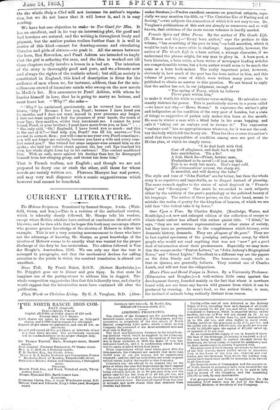ander Stralsan.)--T-welve excellent sermons-on- practical subjects, espe- cially we may
mention-the fifth, on "The Christian Use of Fasting and of Society,"—two subjects the connection of which it is not easy to see. Dr. Vaughan's publications of this sort are already so numerous and so well known, that criticism of- the more recent volumes is hardly needed. Francis Spires and Other Poems. By the author of The Gentle L. (E. Moxon and Co.)—" Every born author," says the preface to this volume, "has something of the poet in him,"- a bold assertion, which it would be rash for a mere critic to challenge. Apparently, however, the author of The Gentle Life is a born author; a strange character, if we understand the phrase aright, for any man to glory in. A born poet, a born historian, a born critic, a born writer of newspaper leading articles are comprehensible terms, but a born author would seem to be much the same as a born book-maker. The really important point, however, obviously is, how much of the poet has the born author in him, and this volume of poems, some of which were written many years ago, is published to obtain an answer to this question. We are bound- to reply that the author has not, in our judgment, enough of
"The spring of Poesy, which he believes Flows pure within him,"
to make it worth his while to continuo verse-making. He mistakes con- stantly violence for power. This is particularly shown in a poem called —we know not why—" Hewn Stones." It expressos the author's pity andindignation at the condition of the very poor of London, but a state of things so suggestive of pathos only makes him foam at the mouth. He sees in winter a man with a blind baby in his arms begging, and calls it " taking out an embryo soul to torture it." The expression " embryo soul " has no appropriateness whatever, for it was not the soul, but the body which felt the frosty air. Then the idea crosses the author's mind that these inequalities of condition among men are part of the Divine plan, at which he simply raves.
"I do find fault with God, Cast off allegiance, and dash back my life Into annihilation. 'Tis a lie !
A foul, black lie—Priest, lawyer, man, Predestined to be saved!—if you say this. This is no work but man's. God's angel cold, His circumambient servant, the sharp air, Is merciful, and will destroy the babe."
The style and tone of "John Fairfax" are far better, but then the whole story is so repulsive and improbable, as to disgust instead of pleasing. The same remark applies to the states of mind depicted in " Francis Spira" and " Resurgam." One must be reconciled to such subjects either by the subtlety of the poet's psychology or the polished beauty of his language. The author of these poems, on the other hand, seems to mistake the realm of poetry for the kingdom of heaven, of which we are- told that "the violent take it by force."






























 Previous page
Previous page